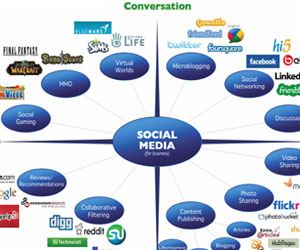


Navigating The Mobile-First Landscape

In today's fast-paced, mobile-first world, mobile marketing has become an essential component of digital marketing strategies. Mobile devices have become integral to our daily lives, providing a direct channel to engage with consumers. To succeed in this dynamic landscape, it's crucial to employ effective mobile marketing techniques. In this article, we'll explore key techniques that can help businesses harness the power of mobile marketing to reach and connect with their target audience.
1. Responsive Web Design
A fundamental mobile marketing technique is to ensure your website is mobile-friendly. Responsive web design ensures that your site adapts to various screen sizes and offers an optimal user experience on mobile devices. A mobile-optimized website is the cornerstone of a successful mobile marketing strategy.
2. Mobile Apps
Developing a dedicated mobile app can be a powerful technique to engage and retain customers. Apps provide a direct and personalized channel for interaction. With features like push notifications, you can reach users with timely updates, promotions, and relevant content.
3. SMS Marketing
Short Message Service (SMS) marketing is a direct and immediate way to connect with customers. Sending promotional offers, updates, and critical information via text messages can be highly effective. It's important to obtain explicit consent and provide easy opt-out options to respect users' privacy.
4. Social Media Marketing
Leverage social media platforms to connect with mobile users. Facebook, Instagram, Twitter, and LinkedIn are popular platforms with a substantial mobile user base. Create engaging content, run targeted ads, and utilize mobile-specific features like Instagram Stories to engage with your audience.
5. Location-Based Marketing
Location-based marketing uses the GPS and location data of mobile devices to deliver relevant and timely messages to users based on their geographic location. Techniques like geofencing can be employed to send notifications or offers to users when they enter specific areas, such as near your physical store.
6. Mobile SEO
Optimize your website and content for mobile search engines. Mobile SEO ensures that your site ranks well in mobile search results. Factors like page load speed, mobile-friendly design, and local SEO optimization play a significant role in mobile search rankings.
7. Video Marketing
Video content is highly engaging on mobile devices. Create compelling video content that is optimized for mobile consumption. Platforms like YouTube, TikTok, and Instagram are ideal for sharing video content and reaching a broad audience.
8. Mobile Advertising
Mobile advertising encompasses a range of ad formats, including display ads, native ads, and in-app ads. Running mobile advertising campaigns on platforms like Google Ads and social media networks allows you to reach users where they spend their time on mobile devices.
9. App Deep Linking
Deep linking within your mobile app can streamline user experiences and enhance engagement. Deep links direct users to specific pages or actions within your app, making it easier for them to perform actions like making a purchase or signing up for a service.
10. Mobile Analytics
Utilize mobile analytics tools to gather data on user behavior and campaign performance. This data-driven approach provides insights into consumer preferences, click-through rates, conversion rates, and more, enabling you to refine your strategies and optimize your return on investment (ROI).
Mobile marketing techniques are crucial for businesses looking to thrive in the mobile-first era. By employing responsive web design, mobile apps, SMS marketing, social media marketing, and other techniques, businesses can effectively reach and engage their audience on mobile devices. Stay data-driven, monitor performance, and adapt to ever-evolving mobile marketing trends to ensure your business remains competitive and successful in the mobile marketing landscape.
Unlocking Success
 3. Precision And Quality: Essential tools often provide a level of precision and quality that is challenging to achieve without them. From high-quality power tools for woodworking to advanced software for graphic design, these tools contribute to the precision and excellence of work.
3. Precision And Quality: Essential tools often provide a level of precision and quality that is challenging to achieve without them. From high-quality power tools for woodworking to advanced software for graphic design, these tools contribute to the precision and excellence of work.
4. Cost Savings: While essential tools may require an initial investment, they often result in cost savings in the long run. By streamlining processes and reducing the need for manual labor, these tools can lead to significant cost efficiency.
5. Versatility: Many essential tools are versatile, capable of performing various functions. This versatility can be especially valuable for individuals and businesses that need to adapt to changing circumstances and demands.
6. Time Savings: Essential tools can dramatically reduce the time required to complete tasks. In professional settings, time savings translate to increased productivity and the ability to take on more projects or serve more clients.
7. Precision And Accuracy: In fields where precision and accuracy are paramount, essential tools are irreplaceable. Whether it's a surgeon's scalpel, a surveyor's level, or a programmer's coding software, these tools ensure that critical work is done correctly.
Strategies For Success In The Digital Age
 4. SEO And Visibility: Search engine optimization (SEO) is vital for ensuring your online content is discoverable. Optimize your content with relevant keywords and meta tags to improve your visibility in search engine results.
4. SEO And Visibility: Search engine optimization (SEO) is vital for ensuring your online content is discoverable. Optimize your content with relevant keywords and meta tags to improve your visibility in search engine results.
5. Embrace Social Media: Social media platforms are powerful tools for connecting with a global audience. Establish a presence on platforms that align with your audience and industry. Regularly sharing content and engaging with your followers can boost your online presence.
6. Email Marketing: Email marketing remains a highly effective way to communicate with your audience. It allows you to nurture leads, provide personalized content, and maintain strong relationships with your subscribers.
7. Consistency And Authenticity: Consistency in your online presence is essential. Maintain a regular posting schedule and stay true to your brand identity. Authenticity is equally important; be genuine and honest in your interactions.






Building Connections In The Digital Age
 The Importance Of Content Marketing
The Importance Of Content Marketing
Building Trust: Content marketing fosters trust with your audience. By consistently providing valuable information, you establish yourself as an authority in your industry and build credibility.
Educating The Audience: It allows you to educate your audience about your products, services, and industry. Informed customers are more likely to make confident purchase decisions.
Engaging And Entertaining: Good content captivates and entertains, keeping the audience engaged. This engagement often leads to longer-lasting relationships with customers.
Search Engine Optimization (SEO): High-quality content is favored by search engines, leading to better search rankings. This can increase the visibility of your business online.
Sharable Content: Well-crafted content is more likely to be shared on social media and other platforms. This helps to increase your reach and brand exposure.
Key Components Of Content Marketing
Content Strategy: Begin by developing a content strategy that outlines your goals, target audience, content types, and publishing schedule. Your strategy will guide your content creation efforts.
Quality Content: Content should be informative, well-researched, and free from errors. It should provide value to your audience and address their needs or interests.
Variety Of Content Types: Diversify your content to cater to different preferences. This may include blog posts, articles, videos, infographics, podcasts, and more.
 Search Engine Optimization (SEO): SEO is the cornerstone of any successful online marketing strategy. It involves optimizing your website and content to rank higher in search engine results. By using relevant keywords, high-quality content, and optimizing technical aspects of your site, you can improve your website's visibility and attract organic traffic. SEO is a long-term strategy that, when executed effectively, can establish your brand as an authority in your industry.
Search Engine Optimization (SEO): SEO is the cornerstone of any successful online marketing strategy. It involves optimizing your website and content to rank higher in search engine results. By using relevant keywords, high-quality content, and optimizing technical aspects of your site, you can improve your website's visibility and attract organic traffic. SEO is a long-term strategy that, when executed effectively, can establish your brand as an authority in your industry.
Content Marketing: Content is king in the world of internet marketing. Creating valuable, informative, and engaging content is essential for attracting and retaining an online audience. Blog posts, articles, videos, infographics, and more can showcase your expertise and provide real value to your target audience.
Social Media Marketing: Social media platforms offer an excellent opportunity to connect with your audience on a more personal level. Establish a presence on platforms like Facebook, Twitter, Instagram, and LinkedIn, and use them to share your content, engage with your followers, and build a loyal community.
 4. Social Media Marketing: Social media platforms are powerful tools for engaging with your audience. Develop a strong presence on platforms like Facebook, Instagram, Twitter, and LinkedIn. Share your content, interact with your followers, and build a loyal community.
4. Social Media Marketing: Social media platforms are powerful tools for engaging with your audience. Develop a strong presence on platforms like Facebook, Instagram, Twitter, and LinkedIn. Share your content, interact with your followers, and build a loyal community.
5. Email Marketing: Email remains one of the most effective ways to connect with your audience directly. Use email marketing campaigns to nurture leads, send personalized offers, and maintain relationships with your customers.
6. Paid Advertising (PPC): Pay-per-click (PPC) advertising is a quick way to reach your audience. With PPC, you bid for ad placement in search engine results or on websites. It's an effective strategy for promoting specific products or services and driving targeted traffic.
7. Data Analytics: Data-driven decisions are essential for a successful internet marketing strategy. Use analytics tools to monitor the performance of your campaigns.
 2. Cost-Effective Marketing: Traditional marketing methods often come with significant costs, making them less accessible for small and medium-sized enterprises. In contrast, internet marketing offers cost-effective solutions, such as pay-per-click advertising and content marketing. This enables even businesses with limited budgets to compete on a level playing field.
2. Cost-Effective Marketing: Traditional marketing methods often come with significant costs, making them less accessible for small and medium-sized enterprises. In contrast, internet marketing offers cost-effective solutions, such as pay-per-click advertising and content marketing. This enables even businesses with limited budgets to compete on a level playing field.
3. Precise Targeting: One of the key advantages of internet marketing is its ability to target specific audiences with precision. Through strategies like audience segmentation and social media advertising, businesses can reach the individuals most likely to be interested in their products or services. This not only increases the efficiency of marketing campaigns but also maximizes the chances of conversion.
4. Data-Driven Decision-Making: Internet marketing provides a wealth of data and analytics tools that allow businesses to track the performance of their campaigns in real time. This data-driven approach enables organizations to make informed decisions, adapt their strategies, and optimize their marketing efforts continuously.